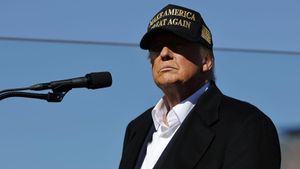Israel is ramping up its military capabilities as tensions continue to escalate across the region, particularly following recent conflicts with Hamas and Hezbollah. The Israeli defense ministry announced on November 7, 2024, the signing of a significant $5.2 billion deal with Boeing to acquire 25 next-generation F-15 fighter jets. This agreement, primarily funded through U.S. military aid, includes options for acquiring up to 25 additional aircraft over the coming years.
Deliveries of these cutting-edge F-15IA jets are set to start as early as 2031, with availability structured to send four to six jets each year. These aircraft will come equipped with advanced weapon systems and enhanced Israeli technologies, significantly improving their operational capabilities such as range and payload.
The deal marks yet another substantial investment during what has been described as Israel's biggest military procurement operation since the outbreak of its conflict with Hamas. Recent arms purchase agreements since the conflict began have reportedly reached nearly $40 billion. Israel’s defense ministry director-general, Eyal Zamir, highlighted the importance of balancing immediate needs for advanced weaponry with the development of long-term defense capabilities, noting this acquisition as strategic for enhancing Israel's air power.
Since the outbreak of hostilities, Israel has been actively engaging with both Hamas targets within Gaza and Hezbollah positions across the border in Lebanon. The situation remains tense, with the Israeli air force conducting frequent operations. They have also launched retaliatory strikes after missiles were fired at Israel from Iranian-supported groups.
Meanwhile, on the international front, South Korea is contemplating its policy on military support amid the Ukraine conflict. President Yoon Suk Yeol’s comments suggest South Korea might, for the first time, supply weapons to Ukraine, marking a pivotal shift from its current stance of not arming conflict-torn nations. This change is seen as partially influenced by North Korea's increasing military collaboration with Russia, including deploying troops and supplying artillery to support the invading forces.
Recent intelligence suggests approximately 10,000 North Korean troops are now present within Russian territory, prompting concerns and potential strategies out of South Korea. President Yoon indicated any weapon provisions would likely focus first on defensive armaments to address escalated threats posed by North Korean aggression.
While grappling with these pressures, Yoon also noted discussions with U.S. President-elect Donald Trump, particularly around North Korea's provocations, which may include missile tests and incursions across South Korean borders. A firmer stance against North Korea characterizes Yoon’s approach compared to his predecessor, aligning more closely with U.S. strategies.
On another significant front, Ukrainian President Volodymyr Zelensky, during discussions at the European summit, firmly rejected any proposals for concessions to Russia, describing them as dangerous not just for Ukraine but for Europe as well. Zelensky emphasized the need for continued support and arms rather than calls for peace talks, stating, “Hugs with Putin won’t help.”
He called out those European leaders advocating concessions, warning them such actions would only exacerbate Russian aggression. Addressing the summit hosted by Hungarian Prime Minister Viktor Orban, Zelensky made it clear he hopes for stronger ties between American and European allies to sustain firm support against future threats.
Lastly, violence continues to ramp up within Pakistan, where recent roadside attacks have resulted in numerous fatalities among security forces. A recent explosion near South Waziristan claimed the lives of four officers, marking yet another blow as the Pakistan Army battles against the resurgence of the Tehrik-i-Taliban Pakistan (TTP). The military responded by claiming to have killed multiple TTP militants following the attack, intensifying the already fraught security environment.
The prevailing narrative across these various fronts—Israel's military buildup, shifting policies from South Korea, firm stances against Russian aggression by Ukraine, and the violence erupting within Pakistan—paints a picture of heightened global tension where military forces are acting more aggressively. With strategic partnerships and realignments forming, observers are left pondering what these developments mean for the stability of the Middle East and beyond as nations prepare for what could be growing confrontations internationally.



